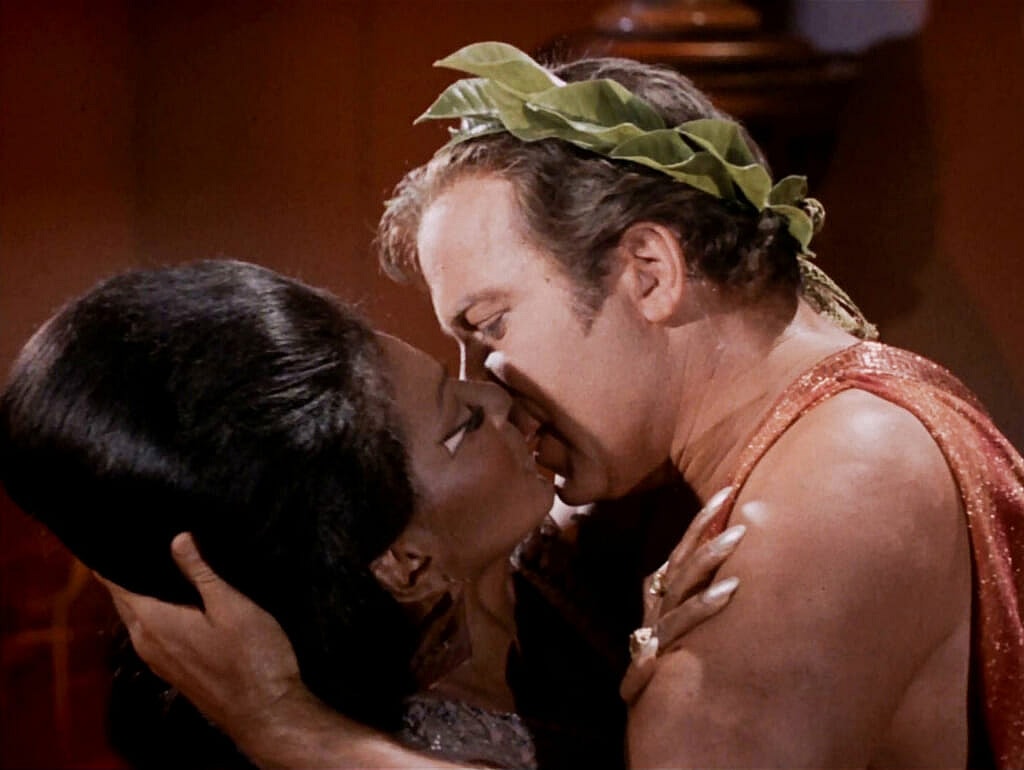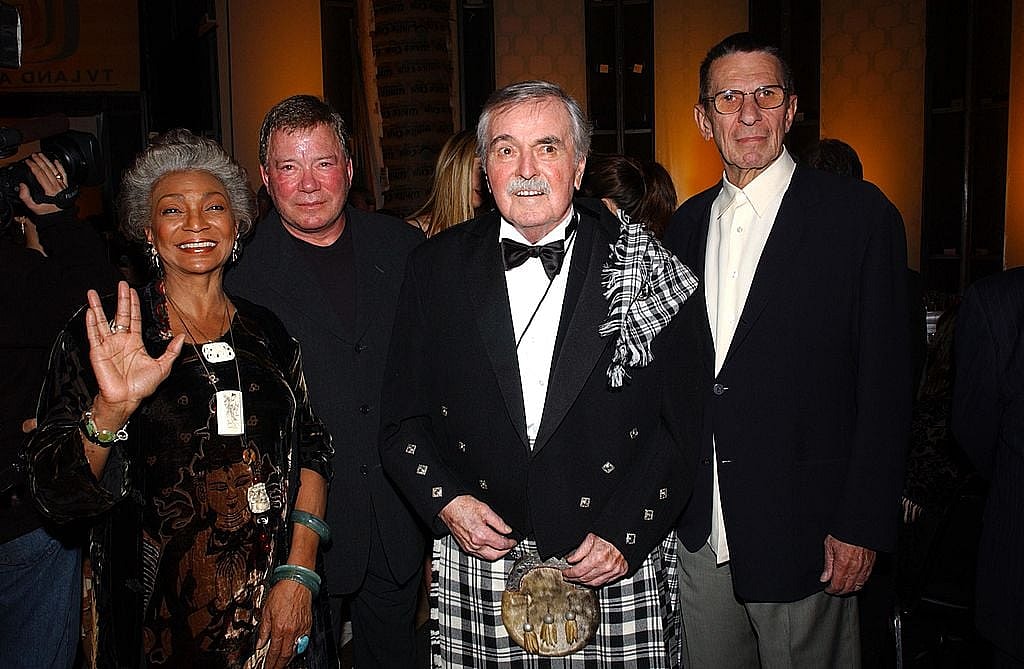Trailblazing actress Nichelle Nichols at one point considered leaving her role as communications officer Lt. Nyota Uhura on Star Trek. The accomplished singer and dancer wanted to return to Broadway, her first love, where she worked with the greats, including Duke Ellington.
It was not until a surprise meeting with a special fan who convinced her that her Star Trek role carried more weight to push forward the nation’s future. The special fan was Dr. Martin Luther King Jr., who shared he was a “Trekkie” and how his wife Coretta allowed their three children to stay up to watch the show because of her. King told her, “Do you not understand what God has given you? …You have the first important non-traditional role, non-stereotypical role. …You cannot abdicate your position. You are changing the minds of people across the world because for the first time, through you, we see ourselves and what can be.” Nichols shared in an interview for PBS’ Pioneers of Television.
King continued: “You don’t understand the effect that you are having, not only on Black people, not only on young women but on everybody. Everybody’s mind and attitude is changed immeasurably simply because you are there.”
Nichols was stunned. “I didn’t even know how to say thank you,” she said. Nichols, who died Saturday in Silver City, New Mexico at age 89, rescinded her resignation, staying through the end of the series and successive movies. Her impact moved beyond what she could’ve imagined.
Grace Dell Nichols was born just outside of Chicago in Robbins, Ill.—where her father, a factory worker, was both the town mayor and chief magistrate. Her mother was a homemaker. At a young age, the family eventually moved to Chicago where Nichols was able to study dance with the Chicago Ballet.
At age 15, Duke Ellington discovered the talented Nichols, and she soon began touring the country with his big band. That led her to dance and sing with other iconic figures like Lionel Hampton. For many years, she worked as a model and stage actress. In 1961, she earned a spot in Oscar Brown’s musical Kicks and Co., which had a tumultuous short run in Chicago. She also appeared in the role of Carmen for a Chicago stock company production of Carmen Jones, and she also performed as a dancer in the film production of Porgy and Bess.
In 1964, she landed her first television appearance in The Lieutenant, a short-lived series written by Gene Roddenberry. Two years later, Roddenberry would create Star Trek and cast Nichols in her groundbreaking role as Lt. Uhura. She was among very few Black female actresses (including Cicely Tyson) who were featured in leading parts on television during a time of civil and racial unrest.
Star Trek is often credited with scripting the first interracial kiss on national television—though it wasn’t true, it certainly was the most impactful—in the episode titled “Plato’s Stepchildren,” which first aired on November 22, 1968. The response was mixed—some viewers praised the scene and some did not. In her 1994 autobiography Beyond Uhura, Star Trek and Other Memories, Nichols shared an excerpt from a white Southerner’s letter. He wrote: “I am totally opposed to the mixing of the races. However, any time a red-blooded American boy like Captain Kirk gets a beautiful dame in his arms that looks like Uhura, he ain’t gonna fight it.”

Both astronauts Sally Ride and Mae Jemison cited the impact of the show and Lt. Uhura as a role model. In 1983, Ride was the first American woman to go into space, while Jemison was the first Black-American woman to go in 1992. “As a little girl growing up on the south side of Chicago in the ‘60s I always knew I was going to be in space,” Jemison said in a speech at Duke University.
Among the many celebrities and Star Trek colleagues paying tribute to Nichols was one from Martin Luther King Jr.’s youngest daughter, Bernice, who honored her with a tweet about representation.
Georgia’s Democratic gubernatorial candidate Stacey Abrams also shared a fond memory of Nichols and her importance to the culture.
Once Star Trek ended, Nichols assisted NASA in recruiting women and communities of color to its ranks. Her work with NASA is part of the focus of a documentary about her life—Woman in Motion: Nichelle Nichols, Star Trek and the Remaking of NASA. The documentary, released on Paramount + in June 2021, delves into her push to change the face of NASA.
Star Trek was canceled in 1969, but Nichols continued to play a part in various iterations of Star Trek including doing the voice of Uhura in Star Trek: The Animated Series. She also returned to co-star in six Star Trek movies.

In the decades following, she has appeared in various television and film roles, playing a secretary in Doctor, You’ve Got to Be Kidding! (1967). In 1974, she was cast to play Dorinda, a tough madam in the blaxploitation film Truck Turner, opposite Isaac Hayes. She also has appeared in episodes of the animated series Futurama, Gargoyles and The Simpsons. In 2002, she was in the comedy film Snow Dogs, co-starring with Cuba Gooding Jr.
Nichols also landed a recurring role in the second season of the NBC drama Heroes in 2007, and in 2016, she appeared in the soap opera The Young and the Restless as the aging mother of character Neil Winters (played by the late Kristoff St. John). That role landed her first ever Daytime Emmy nomination in the “Outstanding Guest Performer in a Drama Series” category.
Among her other achievements, Nichols was awarded a star on the Hollywood Walk of Fame in 1992 and a Goldene Kamera for Cult Star of the Century in 1999. She also received an honorary degree from Los Angeles Mission College in 2010.
Nichols once reflected on her Uhura character: “I think it’s been one of the most remarkable things in my career…that this one character that was a gift to me…became this iconic image and inspired and impacted so many people’s lives in positive ways.”

Monée Fields-White is an award-winning writer and journalist based in Los Angeles. She has produced a broad spectrum of stories on a national and global scale for leading publications and nonprofit organizations in the four largest markets—Washington, D.C., New York, Chicago and Los Angeles. She can be found on Twitter and LinkedIn.
TheGrio is FREE on your TV via Apple TV, Amazon Fire, Roku, and Android TV. Please download theGrio mobile apps today!


